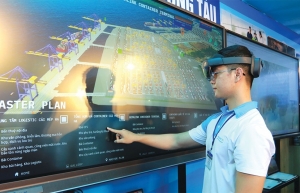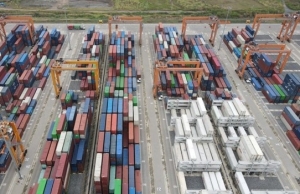Strategic position to aid Vietnam well in industrial real estate
How do you evaluate the investment and development opportunities of specialised industrial real estate products such as ready-built warehouses and factories, cold storage, last-mile logistics, and data centres?
 |
| Paul Tonkes, industrial deputy director for Indochina Kajima Development |
Vietnam is highly appreciated by investors for its plan to reduce supply chain risks. Due to recent disruptions added to unfavourable market factors, investors have difficulty in determining investment size and location, as well as being more hesitant to make new investment decisions.
In fact, although in most of the supply chain ecosystem, the value chain of Vietnam is underdeveloped compared to our peers in the region, Vietnam is facing a special opportunity with queen bees continue to expand and moving into Vietnam, attracting more tier 1-3 suppliers.
It is time for Vietnam to have a more complete legal framework for redevelopment, reuse, and extension of land lease periods, especially for industrial zones (IZs) that are transforming towards a more advanced and green direction with new functions. What I call the redevelopment of areas of land that were previously located as IZs and can now develop new industrial projects on the same land.
Ready-made and tailor-built industrial real estate will become more attractive in the coming years, thereby creating attractive opportunities for existing more traditional investors to relocate and making way for new higher value-added supply chain.
In the longer term, Vietnam is building an increasingly complete supply chain and holds a strategic position in the region. Along with the strong domestic economy, and the shifting from export processing to domestic distribution, the logistics real estate sector will have extreme potential.
Indochina Kajima Development has launched Core5 Vietnam. Can you explain more about what this is?
Core5 Vietnam is an industrial real estate platform focusing on building and developing international-quality factories and warehouses for lease in key manufacturing and logistics areas in Vietnam. It plans to implement high-quality industrial real estate projects throughout Vietnam’s key manufacturing localities.
Core5 currently plans to develop eight projects, providing the market with nearly 700,000 square metres of leasable area, of which seven projects located in production and logistics centres in the north of Vietnam, with a total development capital up to nearly $450 million.
The first project at DEEP C II IZ in Dinh Vu-Cat Hai Economic Zone in Haiphong provides 87,000sq.m of world-class factory for lease. Two others located in DEEP C Quang Ninh-Bac Tien Phong IZ and in Minh Duc IZ of Hung Yen province will together provide an additional 141,000sq.m of factories for lease next year.
With the aim to complete the entire development pipeline projects by 2026, we will continue to acquire new sites for project development to have a national coverage in key hubs for tier 1 and 2, while continuing to be a valued partner providing high-quality services for tenants in our IZs.
What can be recommended to Vietnam to stick to its efforts in the sustainable development of industrial property, through paying attention to environmental, social, and governance factors?
Vietnam should have a rating and certification system for all IZs, like the eco-industrial parks framework or LEED certification. As a result, tenants can directly see the quality of products and to what extent they can contribute to reporting on, as well as reducing, carbon emissions and remaining competitive to function as an Asia-Pacific distribution hub.
At the same time, this rating and certification will also give industrial real estate developers more incentive and responsibility to build a healthy and unhindered supply chain ecosystem in a symbiosis industry. This will help create and maintain the attractiveness of Vietnam’s industrial real estate market. The mechanism requires uniform policies across the board covering all participating provinces to adopt net-zero strategies to improve the productivity of the transforming supply chain.
In addition, if local authorities continue to build smart infrastructure, improve workers’ skills, protect the environment, and secure resources, Vietnam’s position as a regional centre will rise and, at the same time, the demand for industrial real estate will increase.
Specifically, localities need to focus on electricity development planning, water exploitation or rainwater harvest programmes, and training of skilled labour not only for large but especially developing grants and incentives for small- and medium-sized enterprises to contribute to training, innovation, and research and development centres that directly benefit these enterprises when allocating nearby.
 | Digital transformation takes over logistics of the future Changes in e-commerce have prompted the logistics industry to improve the way it provides services in a more professional and efficient manner via digital transformation. |
 | Ba Ria-Vung Tau strives to become regional-scale logistics centre The southern province of Ba Ria-Vung Tau plans to expand its Cai Mep Ha Logistics Centre to 2,204 hectares, turning itself into a logistics hub of the region, according to an action plan on enhancing the locality’s logistics competitiveness and development until 2025. |
What the stars mean:
★ Poor ★ ★ Promising ★★★ Good ★★★★ Very good ★★★★★ Exceptional
Related Contents
Latest News
More News
- Vietnam breaks into Top 10 countries and regions for LEED outside the US (February 05, 2026 | 17:56)
- Fairmont opens first Vietnam property in Hanoi (February 04, 2026 | 16:09)
- Real estate investment trusts pivotal for long-term success (February 02, 2026 | 11:09)
- Dong Nai experiences shifting expectations and new industrial cycle (January 28, 2026 | 09:00)
- An Phat 5 Industrial Park targets ESG-driven investors in Hai Phong (January 26, 2026 | 08:30)
- Decree opens incentives for green urban development (January 24, 2026 | 11:18)
- Public investment is reshaping real estate’s role in Vietnam (January 21, 2026 | 10:04)
- Ho Chi Minh City seeks investor to revive Binh Quoi–Thanh Da project (January 19, 2026 | 11:58)
- Sun Group launches construction of Rach Chiec sports complex (January 16, 2026 | 16:17)
- CEO Group breaks ground on first industrial park in Haiphong Free Trade Zone (January 15, 2026 | 15:47)

 Tag:
Tag:





















 Mobile Version
Mobile Version